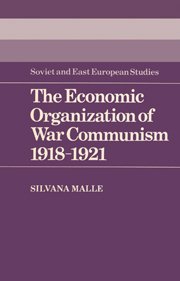Book contents
Summary
WORKERS' CONTROL: LENIN'S VERSION AND THE LAW
Management was one of the hardest issues the leadership had to tackle. Lack of cadres sympathetic to the new government was a major problem which jeopardized the possibility of establishing a competent administration conforming to the political views of the Bolsheviks. This peculiar situation led to an unstable framework for management, which went through three stages: workers' control, state control, party control. Each stage, however, must be interpreted not as a coherent set of institutions, but rather as an unbalanced and precarious equilibrium of forces, none of which was able, so long as war communism lasted, to assert its prevalence over the others. Weakness, lack of experience and inadequate support from the unions all served to isolate the Bolshevik leadership in its effort to master the levers of economic power.
When the Seventh Congress of the Party met on 6–8 March 1918 to decide the question of concluding peace with Germany, Lenin declared in polemics with the left-wing communists that the question of organization could not be solved by the ‘hurrah’ methods by which the Bolsheviks had solved the problems of civil war. The peculiarity of Russia was, added Lenin, that the class which had conquered political power had no means of administering economic power. The bourgeois French Revolution – a recurrent reference for Marxists – had occurred as the outcome of an opposite process. A class excluded from political power, but which had come to hold the economic levers of the country, was able, through a revolutionary upheaval, to oust the aristocracy and firmly take over state administration.
- Type
- Chapter
- Information
- The Economic Organization of War Communism 1918–1921 , pp. 89 - 152Publisher: Cambridge University PressPrint publication year: 1985

